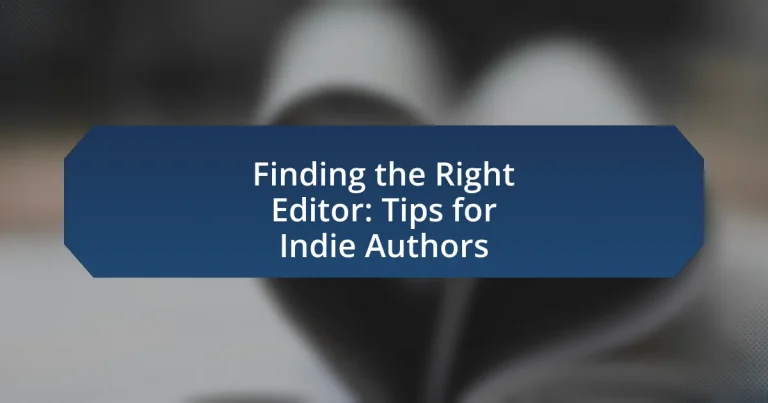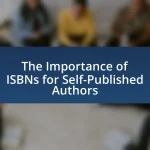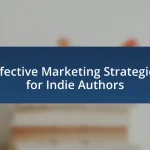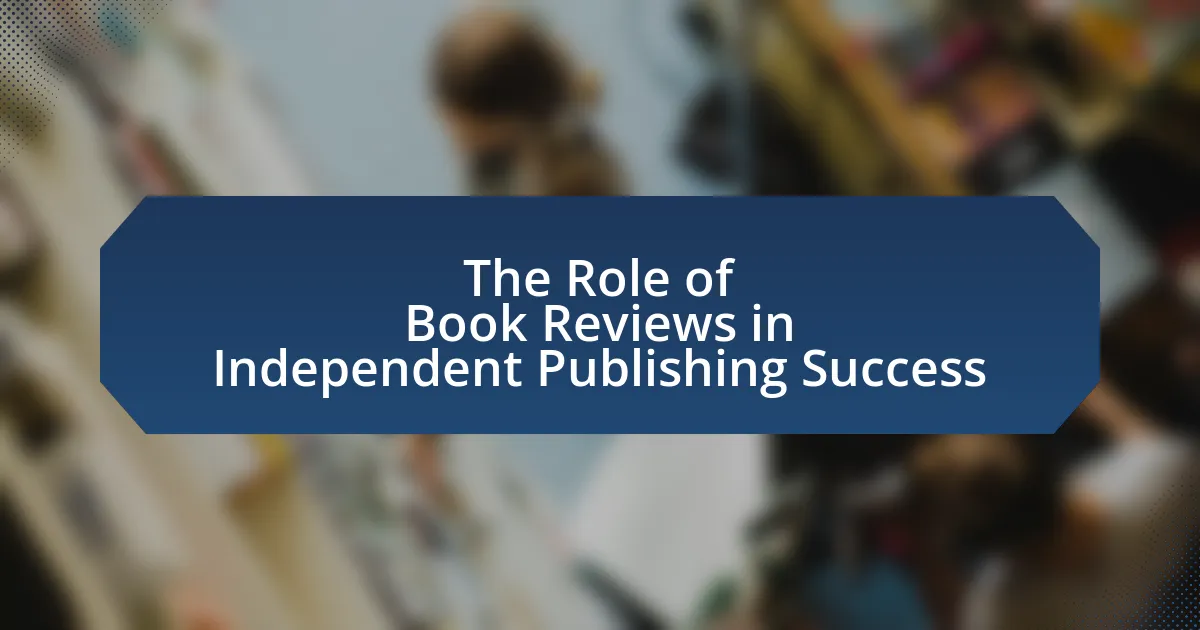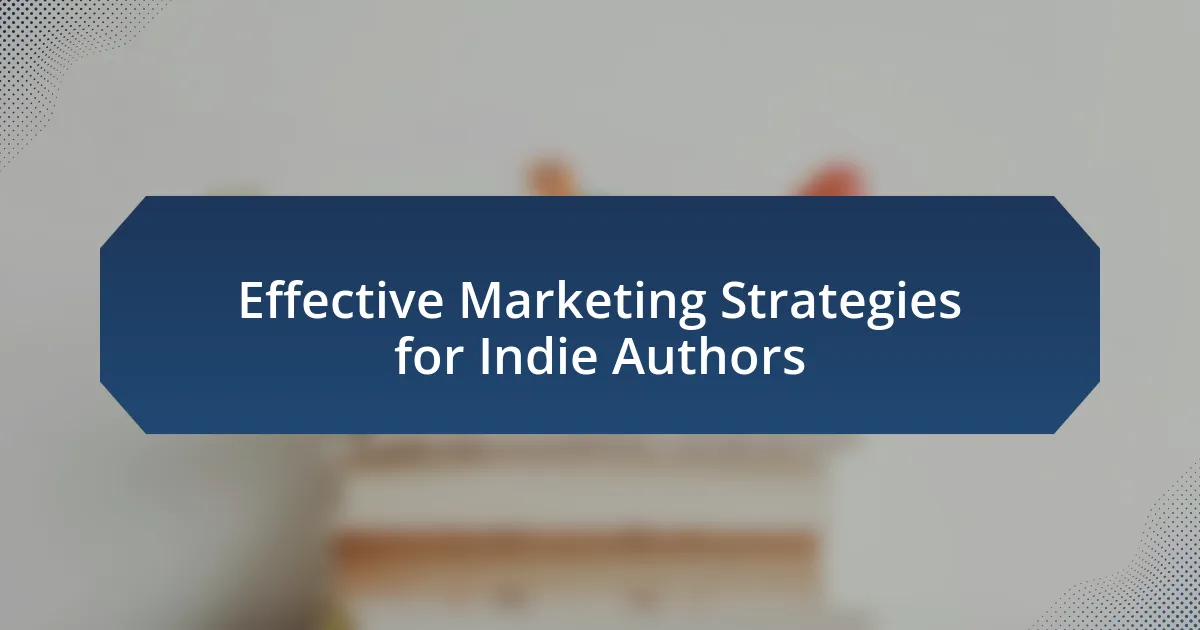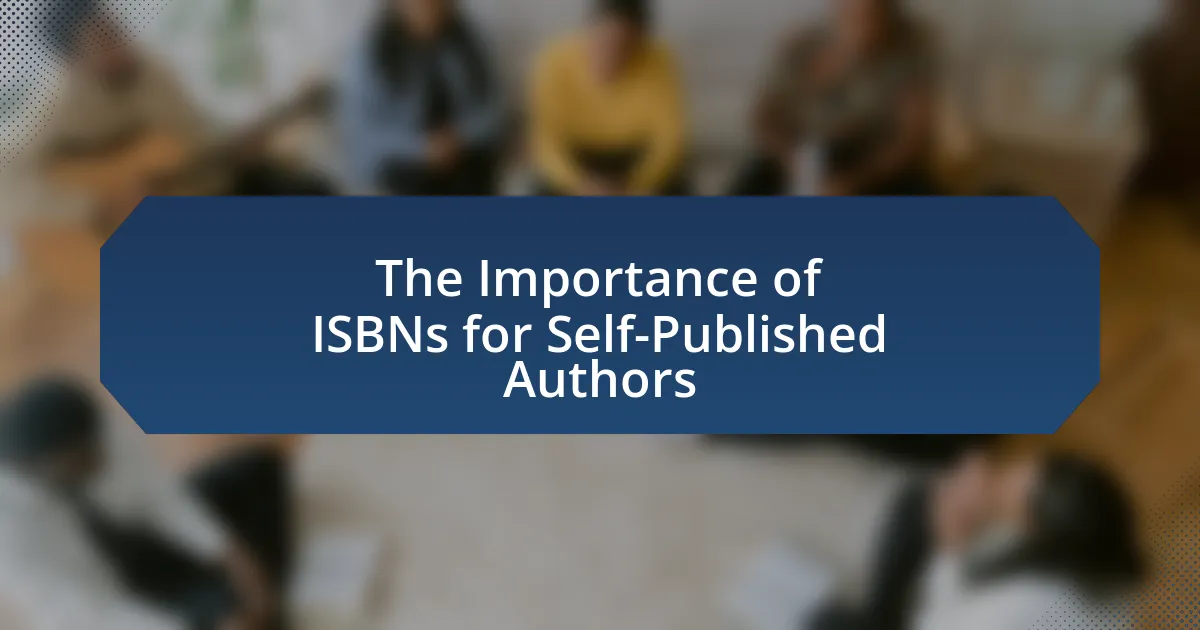The article focuses on the essential considerations for indie authors when selecting the right editor for their manuscripts. It emphasizes the importance of an editor’s experience and specialization in the author’s specific genre, as this can significantly enhance the manuscript’s quality and marketability. The article outlines the various types of editing services available, including developmental editing, copyediting, and proofreading, each serving distinct purposes in the editing process. Additionally, it provides practical tips for authors on how to research and evaluate potential editors, set clear expectations, and remain open to feedback, ultimately guiding them toward a successful collaboration that improves their writing.
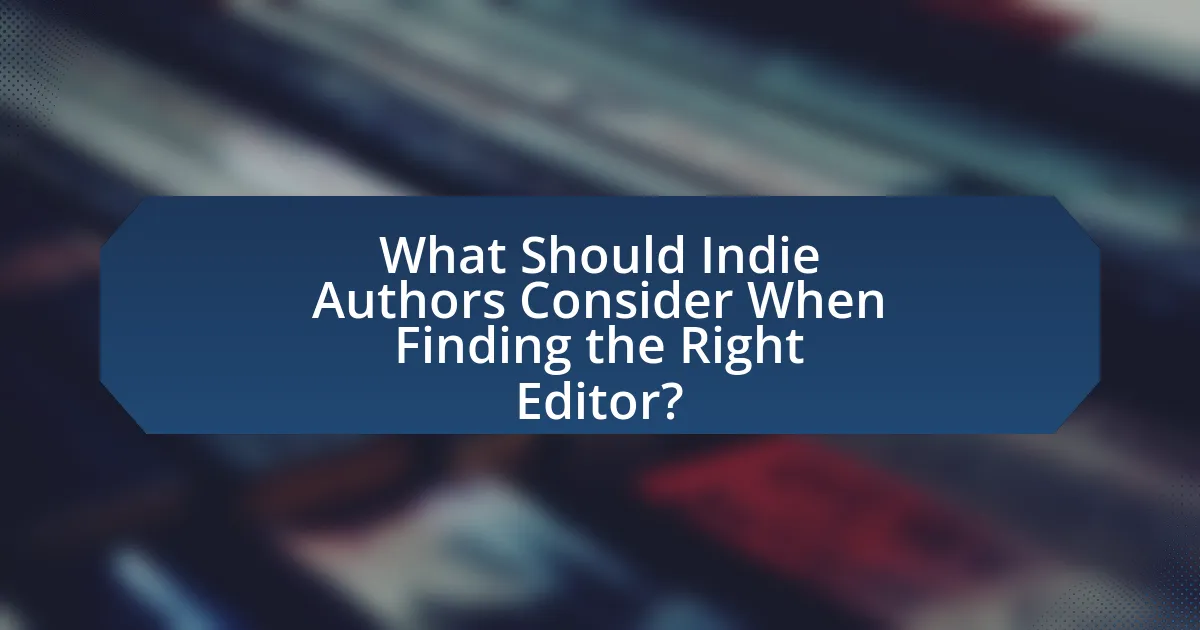
What Should Indie Authors Consider When Finding the Right Editor?
Indie authors should consider the editor’s experience and specialization when selecting the right editor. An editor with a background in the specific genre of the author’s work can provide targeted feedback and insights that enhance the manuscript’s quality. For instance, a study by the Editorial Freelancers Association indicates that editors with genre-specific expertise can significantly improve a manuscript’s marketability and reader engagement. Additionally, authors should evaluate the editor’s previous work and client testimonials to ensure a good fit for their writing style and goals.
How do different types of editing services vary?
Different types of editing services vary primarily in their focus and depth of analysis. Developmental editing addresses the overall structure, content, and flow of a manuscript, often involving significant rewrites and feedback on plot, character development, and pacing. Line editing, on the other hand, concentrates on the style and clarity of the writing, refining sentence structure and word choice without altering the content’s meaning. Copy editing ensures grammatical accuracy, punctuation, and consistency in formatting, while proofreading is the final step that checks for typographical errors and minor mistakes. Each type serves a distinct purpose in the editing process, catering to different stages of manuscript preparation.
What are the main types of editing available for indie authors?
The main types of editing available for indie authors are developmental editing, copyediting, and proofreading. Developmental editing focuses on the overall structure, content, and flow of the manuscript, ensuring that the story is coherent and engaging. Copyediting addresses grammar, punctuation, and style, refining the text for clarity and consistency. Proofreading is the final step, identifying any remaining typos or formatting issues before publication. Each type of editing plays a crucial role in enhancing the quality of the manuscript, making it more appealing to readers and publishers.
How does each type of editing impact the final manuscript?
Each type of editing significantly impacts the final manuscript by addressing different aspects of the text. Developmental editing focuses on the overall structure, plot, and character development, ensuring that the manuscript has a coherent narrative and engages the reader effectively. Line editing concentrates on the language, style, and flow, enhancing readability and ensuring that the author’s voice is clear and consistent. Copy editing targets grammar, punctuation, and formatting, eliminating errors that could distract readers and undermine the manuscript’s professionalism. Finally, proofreading is the last step, catching any remaining typos or minor errors before publication, which ensures the manuscript is polished and ready for its audience. Each editing type contributes uniquely to the manuscript’s quality, making it essential for authors to understand their distinct roles in the editing process.
Why is it important to find an editor who understands your genre?
Finding an editor who understands your genre is crucial because they possess the specific knowledge and expertise needed to enhance your manuscript effectively. An editor familiar with your genre can identify genre-specific conventions, audience expectations, and stylistic nuances that are essential for your work’s success. For instance, a romance editor will know the importance of character chemistry and emotional arcs, while a science fiction editor will focus on world-building and plausibility. This specialized understanding allows the editor to provide targeted feedback, ensuring that your writing resonates with the intended audience and meets industry standards.
What specific qualities should an editor have for different genres?
An editor should possess genre-specific qualities to effectively enhance a manuscript’s appeal and coherence. For fiction, an editor must have a strong sense of narrative structure, character development, and pacing, as these elements are crucial for engaging readers. In contrast, an editor for non-fiction should focus on factual accuracy, clarity, and logical flow, ensuring that the information presented is both credible and accessible.
For genres like romance, an editor should understand emotional resonance and character chemistry, while in genres such as science fiction or fantasy, familiarity with world-building and genre conventions is essential. Additionally, an editor specializing in children’s literature must have a grasp of age-appropriate language and themes, ensuring that the content is suitable for young readers.
These qualities are validated by industry standards, where successful editors often demonstrate expertise in their chosen genres, leading to higher quality publications and reader satisfaction.
How can genre knowledge enhance the editing process?
Genre knowledge enhances the editing process by enabling editors to apply specific conventions and expectations associated with a particular genre. This understanding allows editors to identify elements such as tone, pacing, and character development that are crucial for resonating with the target audience. For instance, a romance editor will focus on emotional arcs and relationship dynamics, while a science fiction editor will prioritize world-building and technological plausibility. By aligning the manuscript with genre standards, editors can improve coherence and marketability, ultimately increasing the likelihood of reader engagement and satisfaction.
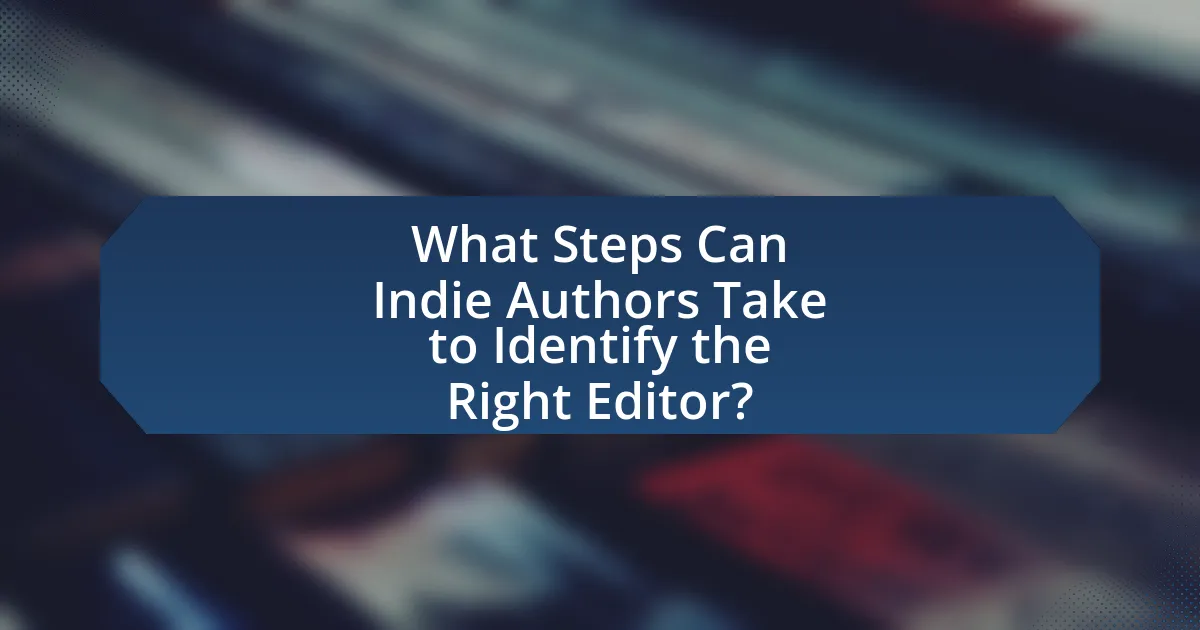
What Steps Can Indie Authors Take to Identify the Right Editor?
Indie authors can identify the right editor by researching potential candidates, reviewing their qualifications, and assessing their editing style. First, authors should seek editors with experience in their specific genre, as familiarity with genre conventions enhances the editing process. Next, authors should examine editor portfolios and testimonials to gauge their previous work quality and client satisfaction. Additionally, conducting interviews or consultations allows authors to discuss their project and evaluate the editor’s communication skills and understanding of the manuscript’s vision. Finally, considering budget and turnaround time is crucial, as these factors can significantly impact the editing experience.
How can indie authors effectively research potential editors?
Indie authors can effectively research potential editors by utilizing online platforms, reviewing editor portfolios, and seeking recommendations from writing communities. Online platforms such as Reedsy and Editorial Freelancers Association provide directories of professional editors, allowing authors to filter by genre and expertise. Reviewing editor portfolios helps authors assess previous work and stylistic compatibility, while recommendations from writing communities, including forums and social media groups, offer insights into editors’ reputations and reliability. This multi-faceted approach ensures that indie authors make informed decisions when selecting an editor, ultimately enhancing the quality of their manuscripts.
What resources are available for finding qualified editors?
Qualified editors can be found through several key resources. Professional organizations such as the Editorial Freelancers Association (EFA) and the American Society of Journalists and Authors (ASJA) provide directories of vetted editors. Online platforms like Reedsy and Upwork also connect authors with freelance editors, allowing for reviews and ratings to assess qualifications. Additionally, social media groups and forums dedicated to writing and publishing often feature recommendations and listings for experienced editors. These resources are widely recognized in the publishing industry, ensuring access to qualified professionals.
How can authors evaluate an editor’s qualifications and experience?
Authors can evaluate an editor’s qualifications and experience by reviewing their educational background, professional certifications, and previous work history. An editor with a degree in English, journalism, or a related field typically possesses foundational knowledge essential for editing. Additionally, certifications from recognized organizations, such as the Editorial Freelancers Association, indicate a commitment to professional standards. Authors should also examine the editor’s portfolio, which should showcase a range of editing projects, including genres similar to the author’s work. Testimonials and references from past clients can further validate the editor’s expertise and reliability.
What questions should authors ask during the initial consultation?
Authors should ask about the editor’s experience with their specific genre during the initial consultation. Understanding the editor’s familiarity with the genre ensures that they can provide relevant insights and feedback tailored to the author’s work. Additionally, authors should inquire about the editor’s editing process, including timelines and communication methods, to establish clear expectations. Asking about the editor’s previous projects and client testimonials can also provide insight into their effectiveness and reliability. These questions help authors gauge whether the editor is a suitable fit for their needs, ultimately influencing the quality of the final manuscript.
How can authors assess an editor’s communication style and approach?
Authors can assess an editor’s communication style and approach by reviewing their previous work and client testimonials. Analyzing samples of the editor’s feedback on manuscripts reveals their tone, clarity, and level of detail, which are critical indicators of their communication style. Additionally, reaching out to past clients for insights on their experiences can provide valuable context regarding the editor’s responsiveness and professionalism. This method is effective because it allows authors to gather concrete examples of the editor’s communication practices, ensuring they align with the author’s expectations and needs.
What should authors inquire about regarding timelines and costs?
Authors should inquire about the estimated timeline for the editing process and the associated costs for various editing services. Understanding the timeline helps authors plan their publication schedule, while knowing the costs allows them to budget effectively. For instance, developmental editing may take several weeks and cost between $1,000 to $3,000, depending on the manuscript’s length and complexity. Additionally, authors should ask about payment structures, such as flat fees versus hourly rates, to ensure clarity in financial commitments.
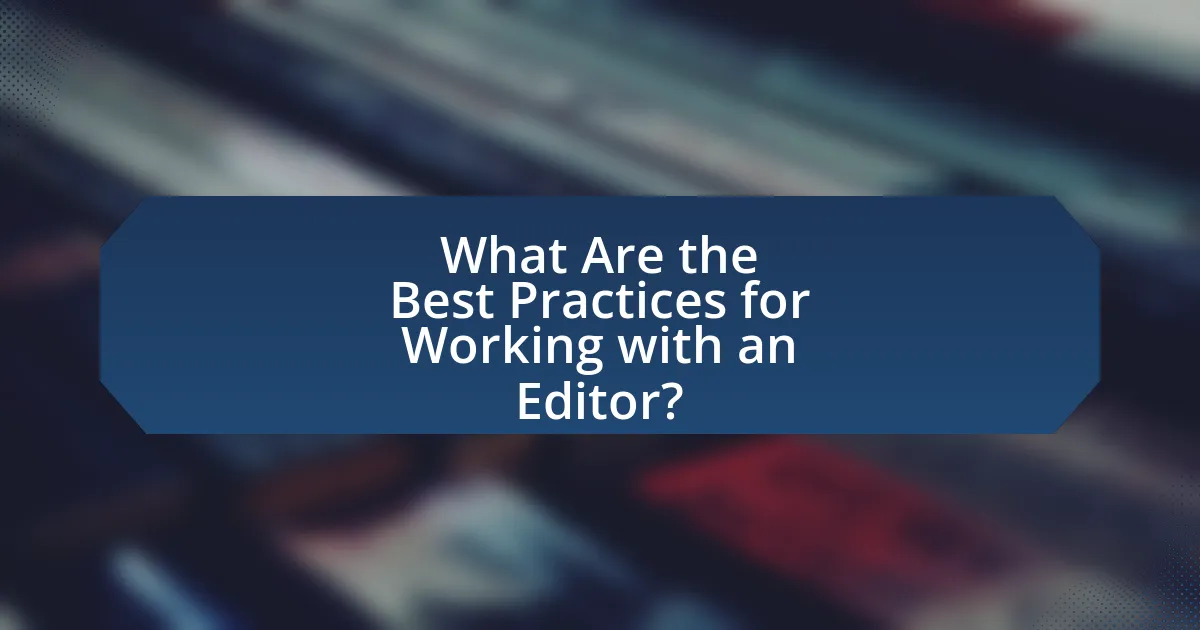
What Are the Best Practices for Working with an Editor?
The best practices for working with an editor include clear communication, setting realistic deadlines, and being open to feedback. Clear communication ensures that both the author and editor understand the project goals and expectations, which is crucial for a successful collaboration. Setting realistic deadlines allows for thorough editing without unnecessary pressure, leading to higher quality work. Being open to feedback fosters a constructive environment where the author can improve their writing based on the editor’s expertise. These practices enhance the editing process and ultimately contribute to a polished final product.
How can authors prepare their manuscript for editing?
Authors can prepare their manuscript for editing by thoroughly revising their work to ensure clarity, coherence, and consistency. This involves checking for grammatical errors, improving sentence structure, and ensuring that the narrative flows logically. Additionally, authors should format their manuscript according to industry standards, which typically includes proper margins, font size, and spacing.
Proof of this preparation process is supported by the fact that a well-prepared manuscript significantly increases the likelihood of a smoother editing process, as editors can focus on content rather than basic errors. According to the Editorial Freelancers Association, a clean manuscript can reduce editing time by up to 50%, highlighting the importance of thorough preparation.
What steps should authors take before submitting their work to an editor?
Authors should thoroughly revise and proofread their work before submitting it to an editor. This includes checking for grammatical errors, ensuring clarity in writing, and confirming that the manuscript adheres to the specific guidelines of the intended editor or publishing house. Additionally, authors should seek feedback from beta readers or writing groups to gain external perspectives on their work. Researching the editor’s previous work and areas of expertise can also help authors tailor their submission to align with the editor’s preferences. These steps enhance the quality of the manuscript and increase the likelihood of a positive response from the editor.
How can authors set clear expectations with their editor?
Authors can set clear expectations with their editor by establishing specific goals for the editing process, including deadlines, communication preferences, and the scope of edits required. By discussing these elements upfront, authors ensure that both parties understand the project’s objectives and timelines. For instance, if an author needs a developmental edit versus a copy edit, clarifying this distinction helps the editor tailor their approach accordingly. Additionally, maintaining open lines of communication throughout the editing process allows for adjustments and feedback, further aligning expectations. This proactive engagement fosters a collaborative environment, ultimately leading to a more successful editing experience.
What common pitfalls should authors avoid during the editing process?
Authors should avoid several common pitfalls during the editing process, including neglecting to take breaks between writing and editing, which can lead to oversight of errors. Additionally, failing to seek feedback from beta readers or professional editors can result in missed opportunities for improvement. Authors often make the mistake of editing their own work too closely, which can create a bias that obscures flaws. Another pitfall is not having a clear editing plan or timeline, which can lead to rushed or incomplete edits. Lastly, authors should avoid becoming overly attached to their original text, as this can hinder necessary changes for clarity and coherence.
How can authors ensure they remain open to feedback?
Authors can ensure they remain open to feedback by actively seeking diverse perspectives and fostering a mindset of growth. Engaging with beta readers, critique groups, or professional editors allows authors to receive varied insights that can enhance their work. Research indicates that authors who embrace constructive criticism are more likely to improve their writing skills and produce higher-quality content. For instance, a study published in the Journal of Writing Research found that writers who participated in peer review processes reported significant gains in their writing abilities. This demonstrates that openness to feedback not only aids in refining a manuscript but also contributes to the author’s overall development.
What are the risks of not following an editor’s suggestions?
Not following an editor’s suggestions can lead to significant risks, including decreased manuscript quality and potential rejection by publishers. Editors provide expertise that enhances clarity, coherence, and overall effectiveness of the writing. Ignoring their feedback may result in unresolved issues, such as plot inconsistencies or grammatical errors, which can detract from the reader’s experience. Additionally, failure to implement suggested changes can hinder an author’s credibility and marketability, as a polished manuscript is often crucial for attracting agents and publishers. Studies show that manuscripts that undergo thorough editing have a higher acceptance rate, underscoring the importance of adhering to editorial advice.
What practical tips can help indie authors find the right editor?
Indie authors can find the right editor by researching and vetting potential candidates thoroughly. Start by seeking recommendations from fellow authors or writing communities, as personal referrals often lead to trustworthy professionals. Next, review editors’ websites and portfolios to assess their experience and specialization, ensuring they align with the genre and style of your work. Additionally, consider requesting sample edits to evaluate their editing style and compatibility with your vision. According to the Editorial Freelancers Association, a good editor should not only improve the manuscript but also respect the author’s voice, which is crucial for maintaining the integrity of the work.
